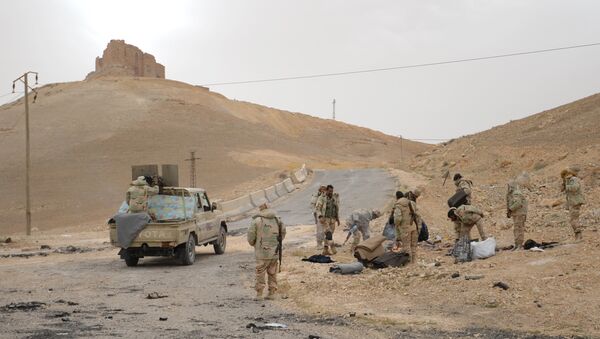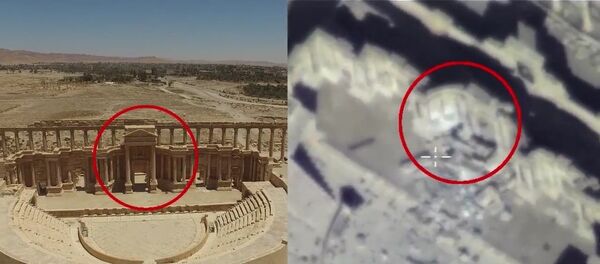Earlier reports indicated that Daesh (terrorist group banned in Russia) militants had largely withdrawn from the city following a fierce offensive by the government forces, which led to the recapture of the strategic hills around Palmyra and the Palmyra citadel on Wednesday.
#SAA and allies have liberated #Palmyra and AlAmerieh suberb pic.twitter.com/w0400HRRlg
— maytham (@maytham956) 2 марта 2017 г.
The Syrian army began on Thursday fortifying defensive positions around the ancient city of Palmyra and preparing the demining of the historical part of the city following its liberation from Daesh, a Sputnik correspondent reported.
No explosive devices have been found in the Roman Theater after a preliminary search, although the cables discovered in the ruins and around the columns indicate that the terrorists planned to blow up the remains of the monument before leaving the city.
Daesh seized Palmyra, which was the capital of the Palmyrene Empire and one of the richest cities of the Roman Empire, in May 2015. Terrorists destroyed a number of historic sights designated as UNESCO World Heritage Sites, including the Arch of Triumph, the Temple of Baalshamin and the Temple of Bel. Jihadists also looted the national museum and the famous Palmyra’s necropolis.
BREAKING: The Syrian Army, supported by the Russian Aerospace Forces, has liberated the ancient city of #Palmyra from ISIS terrorists. 🇸🇾 ✌️ pic.twitter.com/fj9Hjul29j
— Sarah Abdallah (@sahouraxo) 2 марта 2017 г.
Less than a year after that the Syrian army supported by the Russian Aerospace Forces managed to liberate Palmyra. Russian specialists demined the historic center as well as residential areas of the city. Russian historians and renovators visited Palmyra in early July 2016 and prepared a report assessing the condition of the damaged sites and costs of the renovation works. However, in December 2016, the city was retaken by jihadists.
Since 2011, Syria has been engulfed in a civil war, with government forces fighting against numerous opposition and terrorist groups, including al-Nusra Front and Daesh, banned in a range of countries, including Russia.
Moscow has been conducting a counter-terrorist campaign in Syria since September 30, 2015, at President Bashar Assad's request.



